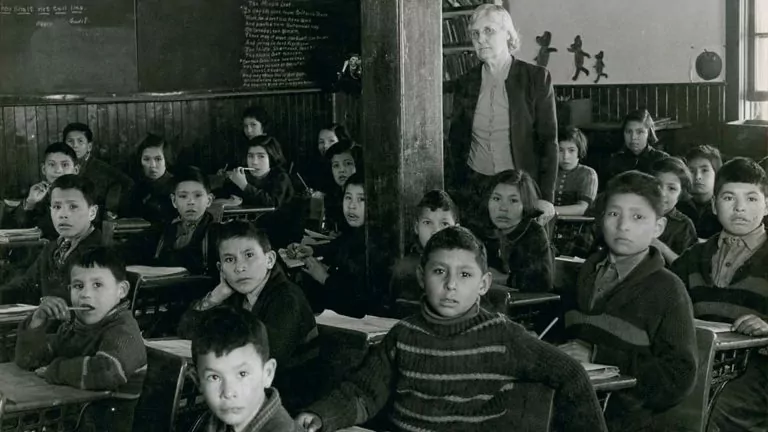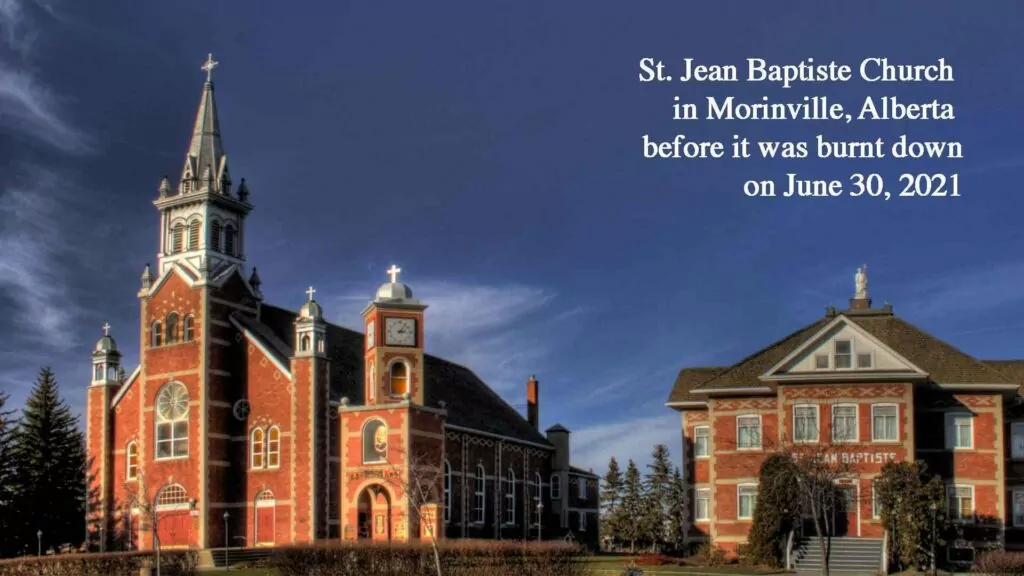For the past several months, Canada has been convulsed by the heartbreaking rediscovery of hundreds—and likely thousands—of child graves outside residential schools where Indigenous children were placed (incarcerated is probably a better word) by the Canadian government to “kill the Indian in the child.” The history of residential schools is one of the blackest in Canadian history, and anyone who has read even portions of the Truth and Reconciliation Commission’s report (I did research on forced abortions in residential schools several years ago) must conclude that this was a systematic crime committed against entire peoples.
As Terry Glavin wrote in the National Post:
“Imprisoned in chronically underfunded institutions that were incubation chambers for epidemic diseases, the children died in droves. Enfeebled by homesickness, brutal and sadistic punishments and wholly inadequate nutrition, they died from tuberculosis, pneumonia, the Spanish influenza and measles, among any number of proximate causes. At the Old Sun boarding school in Alberta, there were years when children were dying at 10 times the rate of children in the settler population…
“The TRC report chronicles barbaric punishments, duly recorded by federal bureaucrats and officials with the churches that ran the schools. Students shackled to one another, placed in handcuffs and leg irons, beaten with sticks and chains, sent to solitary confinement cells for days on end — and schools that knowingly hired convicted “child molesters.” Only a few dozen individuals have ever been prosecuted and convicted for the abuse those children endured.”
In much of the debate over the nuances of these re-emerging stories, I think an opportunity for appropriate empathy is sometimes lost. Yes, it is true that not all of the children were abused. Yes, it is true that healthcare standards during that time meant that diseases were far more deadly. Yes, some students remain ambivalent about their experiences to this day. But none of this changes the central fact of the matter: Children were forcibly removed by the state from their families for the express purpose of destroying their family bonds and eradicating their language and culture.
If they’d come for our kids…
I hail from the Dutch diaspora in Canada, and like many immigrant groups in our multicultural patchwork, our communities have remained largely culturally homogenous. Imagine if the Canadian government had decided, at some point, that Dutch-Canadian (or Sikh or Ukrainian or Jewish) culture needed to be destroyed for the good of the children in those communities, who needed to be better assimilated. Then, imagine if the government forcibly removed children as young as three years old from the parental home – state-sanctioned kidnapping. At school, they were deprived of their grandparents, parents, siblings, language, and culture—and told that their homes were bad for them.
At the end of the experience, if the child survived disease, abuse, bullying, and loneliness, he or she would have been remade in the image of the state – and community bonds would have been severed and many relationships irrevocably destroyed. The children who died of disease were often buried on school grounds. That means many children were taken by the government – and their families simply never saw them again. Imagine, for just a moment, if that was your family. If you were removed from your family. If your children were removed from you. How might you feel about Canada if her government had, for generations, attempted to destroy everything precious to you? It is a question worth reflecting on.
Over the past decade, as religious liberty has been steadily eroded by Western governments, many Christians have wondered, fearfully, whether the authorities will eventually interfere with how they raise their children. Christian parents have been presented as a threat to their own children because of their “hateful” Christian values. When considering the residential schools, Christians should realize that what happened to Indigenous people in Canada is their own worst nightmare. This happened to real children and real families within living memory. Those families have not yet recovered. That devastation cannot be undone – it can only be survived.
The intergenerational damage from these state-inflicted wounds ripples forward in time – and social conservatives, of all people, should be able to understand the fallout from family breakup. Except in this case, the families were forcibly broken up, against their will. As a father and member of large families, I cannot fathom the helplessness, despair, and rage that those who saw their family members stolen from them must have felt. Imagine losing your three-year-old son or daughter to the government, with no recourse for getting your child back. Imagine never seeing that child again. Hatred is absolutely never the answer. But I can certainly understand it.
Why minimize this crime?
If it had been my child stolen from me, who then died from disease years later and was never returned, I can imagine how I would feel if the response from people was: “Well, lots of people died from disease.” Or: “Many of the educators tried their best.” Or: “It wasn’t feasible to send the bodies of the stolen children home.” I can imagine how I would feel if I heard that in response to raw pain and grief at state-perpetrated injustice. I would feel as if people weren’t listening; didn’t care; and were simply, once again, making excuses. There are times when injustice must be faced in the raw, and the intricacies of healthcare in the early part of the last century can be discussed some other time.
Over the past several weeks, residential school survivors have come forward anew to detail their experiences. Many of them struggled with substance abuse as a result of what they endured; many of the issues with alcohol and drugs on some Indigenous reserves today stem from the state-perpetrated breakup of their families. It is easy for those looking at reserves from the outside in to criticize without realizing the context for the state of many families, which would likely still be whole if the Canadian government had not intentionally destroyed them. This is not to say that people bear no responsibilities for their actions. It is to say that we should consider how we would think if the government had perpetrated this on our own communities.
Christians know how important families are
For several generations, social conservative and Christian scholars have been warning that family breakup is at the root of many of our social ills. Largescale family breakup results in crime, risky behavior, substance abuse, mental illness, PTSD, and other traumas and anti-social behavior. Fatherlessness is one of the greatest disadvantages a boy can face. In the case of our society at large, family breakup was largely facilitated by the Sexual Revolution (and in many communities, wealth has cushioned the blow and masked the damage). In Indigenous communities, family breakup was inflicted by the state, and the consequences they have suffered as a result have been devastating. Social conservatives should be able to intuitively understand this.
I’ve said many times that I believe the real “privilege” in our society is not primarily racial, as progressives claim – but the blessing of growing up in a two-parent home where a mother and father love their children. This is a tremendous social advantage, and it was denied to generations of Indigenous children by the government, who felt they would be better off without the love and influence of their parents and grandparents. In her recent book Primal Screams: How the Sexual Revolution Created Identity Politics, Mary Eberstadt explored how family breakup inhibits the passing down of knowledge and skills from one generation to the next. Again, this is a key part of the puzzle that social conservatives should instinctively recognize.
During university, I toured an abandoned residential school in British Columbia with several other students. Our guide was a survivor who told us about the children who had died there and the abuse they had suffered. I remember the cold, damp chill of a dark tunnel in the basement as he told us how he and others had been locked there in the blackness for using their own language. His voice was heavy with pain, and it struck me again that these things are not history – they are still memory. There are thousand of Indigenous Canadians still living with the effects of these government policies, and their anger is well-warranted. We should listen to them and remember once again the horrors that unfold when the government wields power over families for the so-called good of the children.
Jonathon Van Maren is an author and pro-life activist who blogs at TheBridgehead.ca from where this is reprinted with permission. Jonathon was the guest on a recent edition of the Real Talk podcast. Photo is “All Saints Indian Residential School, Cree students at their desks with their teacher in a classroom, Lac La Ronge, March 1945” and is cropped from the original in the Library and Archives Canada collection.











